(期末考点培优)专题07 句型转换-2024-2025学年八年级英语下册期末复习考点培优专项北师大版(含答案解析)
文档属性
| 名称 | (期末考点培优)专题07 句型转换-2024-2025学年八年级英语下册期末复习考点培优专项北师大版(含答案解析) | 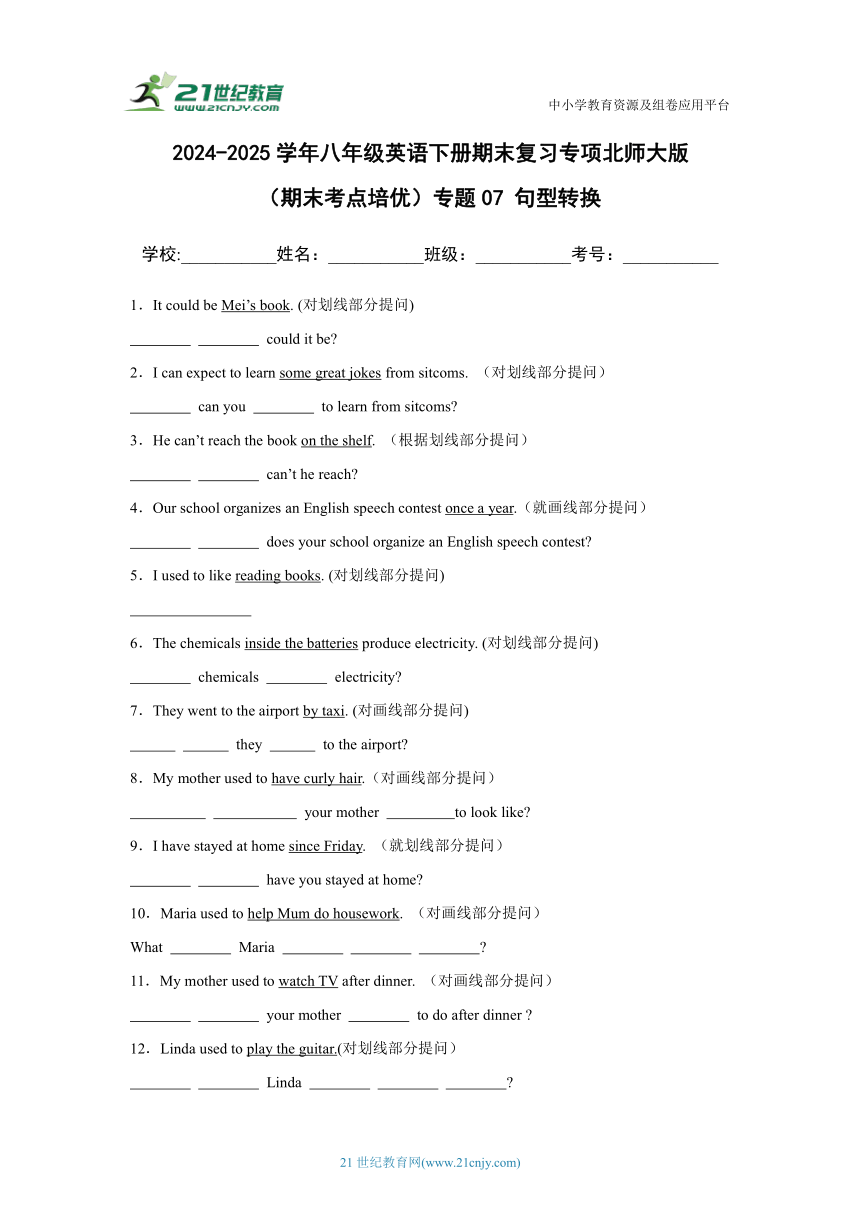 | |
| 格式 | docx | ||
| 文件大小 | 61.6KB | ||
| 资源类型 | 试卷 | ||
| 版本资源 | 北师大版 | ||
| 科目 | 英语 | ||
| 更新时间 | 2025-06-02 21:50:40 | ||
图片预览

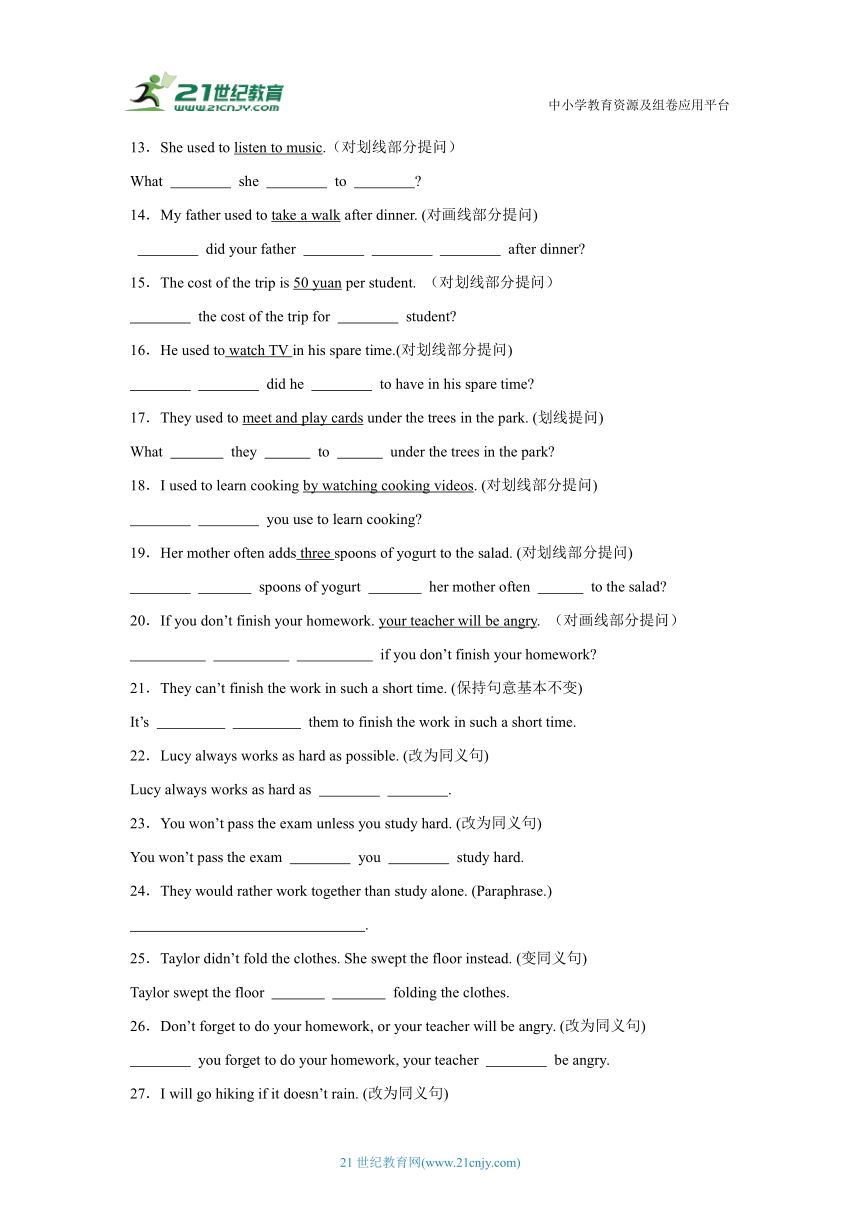
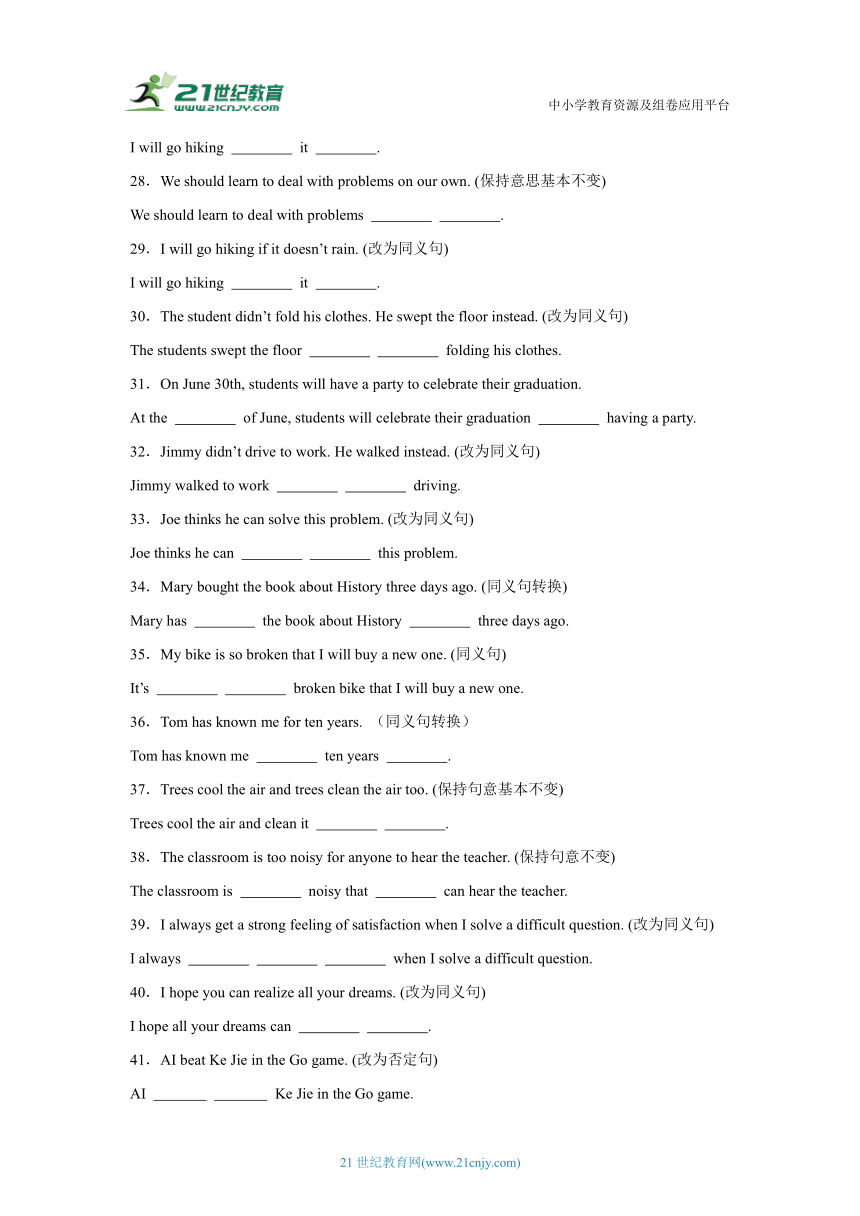
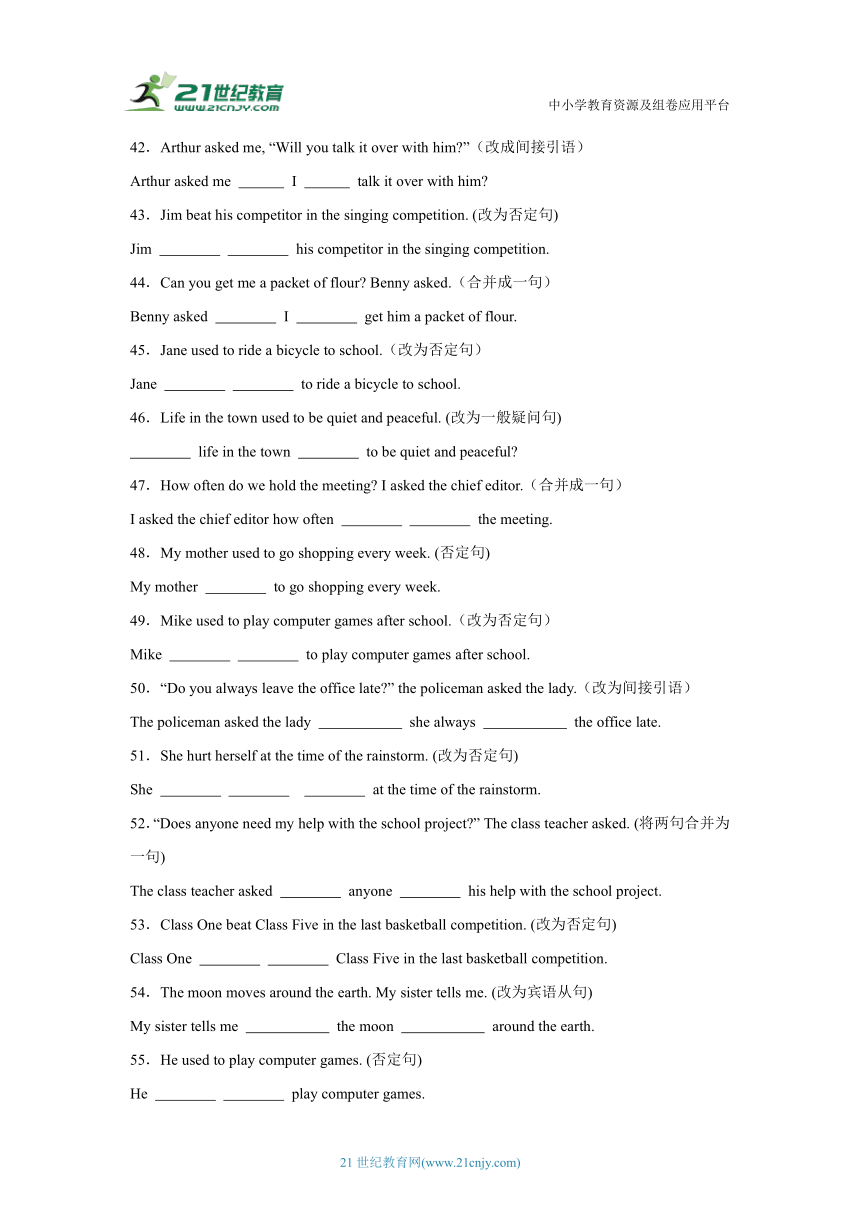
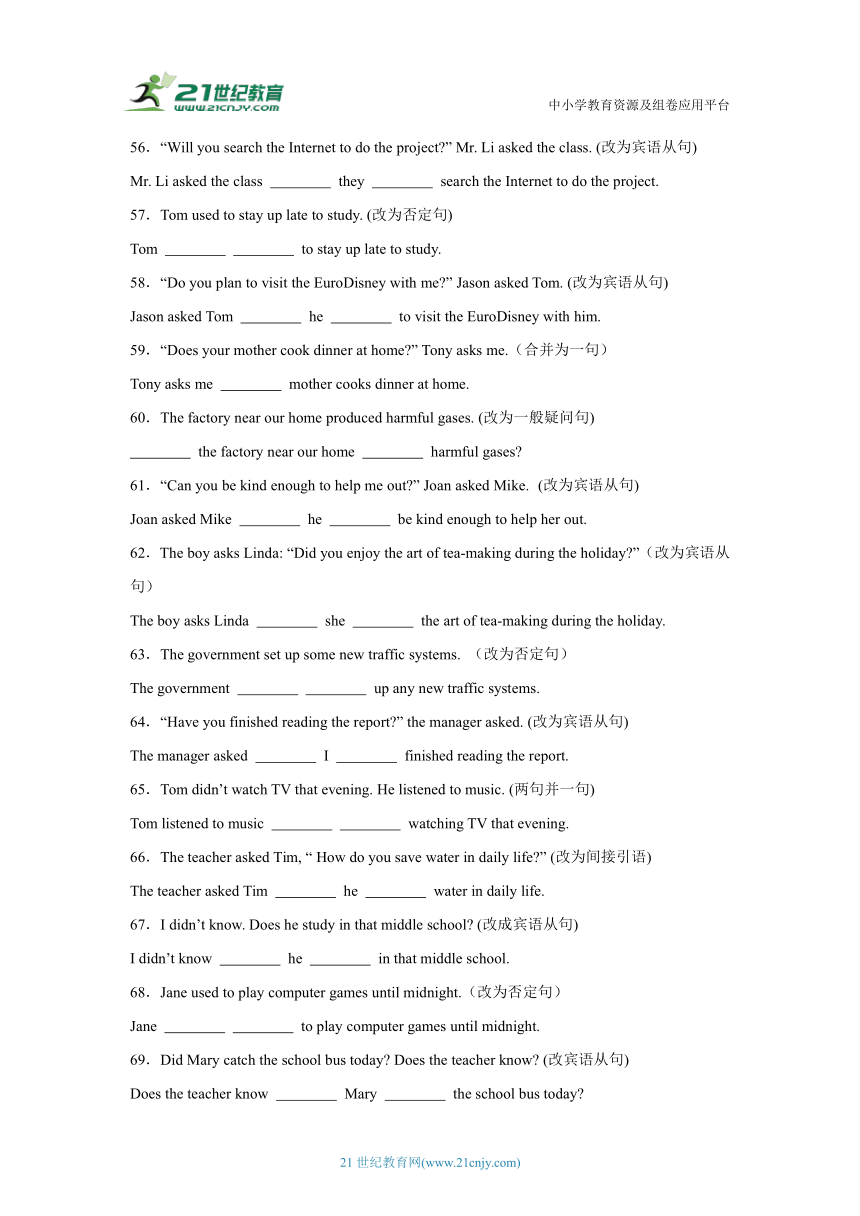
文档简介
中小学教育资源及组卷应用平台
中小学教育资源及组卷应用平台
2024-2025学年八年级英语下册期末复习专项北师大版
(期末考点培优)专题07 句型转换
学校:___________姓名:___________班级:___________考号:___________
1.It could be Mei’s book. (对划线部分提问)
could it be
2.I can expect to learn some great jokes from sitcoms. (对划线部分提问)
can you to learn from sitcoms
3.He can’t reach the book on the shelf. (根据划线部分提问)
can’t he reach
4.Our school organizes an English speech contest once a year.(就画线部分提问)
does your school organize an English speech contest
5.I used to like reading books. (对划线部分提问)
6.The chemicals inside the batteries produce electricity. (对划线部分提问)
chemicals electricity
7.They went to the airport by taxi. (对画线部分提问)
they to the airport
8.My mother used to have curly hair.(对画线部分提问)
your mother to look like
9.I have stayed at home since Friday. (就划线部分提问)
have you stayed at home
10.Maria used to help Mum do housework. (对画线部分提问)
What Maria
11.My mother used to watch TV after dinner. (对画线部分提问)
your mother to do after dinner
12.Linda used to play the guitar.(对划线部分提问)
Linda
13.She used to listen to music.(对划线部分提问)
What she to
14.My father used to take a walk after dinner. (对画线部分提问)
did your father after dinner
15.The cost of the trip is 50 yuan per student. (对划线部分提问)
the cost of the trip for student
16.He used to watch TV in his spare time.(对划线部分提问)
did he to have in his spare time
17.They used to meet and play cards under the trees in the park. (划线提问)
What they to under the trees in the park
18.I used to learn cooking by watching cooking videos. (对划线部分提问)
you use to learn cooking
19.Her mother often adds three spoons of yogurt to the salad. (对划线部分提问)
spoons of yogurt her mother often to the salad
20.If you don’t finish your homework. your teacher will be angry. (对画线部分提问)
if you don’t finish your homework
21.They can’t finish the work in such a short time. (保持句意基本不变)
It’s them to finish the work in such a short time.
22.Lucy always works as hard as possible. (改为同义句)
Lucy always works as hard as .
23.You won’t pass the exam unless you study hard. (改为同义句)
You won’t pass the exam you study hard.
24.They would rather work together than study alone. (Paraphrase.)
.
25.Taylor didn’t fold the clothes. She swept the floor instead. (变同义句)
Taylor swept the floor folding the clothes.
26.Don’t forget to do your homework, or your teacher will be angry. (改为同义句)
you forget to do your homework, your teacher be angry.
27.I will go hiking if it doesn’t rain. (改为同义句)
I will go hiking it .
28.We should learn to deal with problems on our own. (保持意思基本不变)
We should learn to deal with problems .
29.I will go hiking if it doesn’t rain. (改为同义句)
I will go hiking it .
30.The student didn’t fold his clothes. He swept the floor instead. (改为同义句)
The students swept the floor folding his clothes.
31.On June 30th, students will have a party to celebrate their graduation.
At the of June, students will celebrate their graduation having a party.
32.Jimmy didn’t drive to work. He walked instead. (改为同义句)
Jimmy walked to work driving.
33.Joe thinks he can solve this problem. (改为同义句)
Joe thinks he can this problem.
34.Mary bought the book about History three days ago. (同义句转换)
Mary has the book about History three days ago.
35.My bike is so broken that I will buy a new one. (同义句)
It’s broken bike that I will buy a new one.
36.Tom has known me for ten years. (同义句转换)
Tom has known me ten years .
37.Trees cool the air and trees clean the air too. (保持句意基本不变)
Trees cool the air and clean it .
38.The classroom is too noisy for anyone to hear the teacher. (保持句意不变)
The classroom is noisy that can hear the teacher.
39.I always get a strong feeling of satisfaction when I solve a difficult question. (改为同义句)
I always when I solve a difficult question.
40.I hope you can realize all your dreams. (改为同义句)
I hope all your dreams can .
41.AI beat Ke Jie in the Go game. (改为否定句)
AI Ke Jie in the Go game.
42.Arthur asked me, “Will you talk it over with him ”(改成间接引语)
Arthur asked me I talk it over with him
43.Jim beat his competitor in the singing competition. (改为否定句)
Jim his competitor in the singing competition.
44.Can you get me a packet of flour Benny asked.(合并成一句)
Benny asked I get him a packet of flour.
45.Jane used to ride a bicycle to school.(改为否定句)
Jane to ride a bicycle to school.
46.Life in the town used to be quiet and peaceful. (改为一般疑问句)
life in the town to be quiet and peaceful
47.How often do we hold the meeting I asked the chief editor.(合并成一句)
I asked the chief editor how often the meeting.
48.My mother used to go shopping every week. (否定句)
My mother to go shopping every week.
49.Mike used to play computer games after school.(改为否定句)
Mike to play computer games after school.
50.“Do you always leave the office late ” the policeman asked the lady.(改为间接引语)
The policeman asked the lady she always the office late.
51.She hurt herself at the time of the rainstorm. (改为否定句)
She at the time of the rainstorm.
52.“Does anyone need my help with the school project ” The class teacher asked. (将两句合并为一句)
The class teacher asked anyone his help with the school project.
53.Class One beat Class Five in the last basketball competition. (改为否定句)
Class One Class Five in the last basketball competition.
54.The moon moves around the earth. My sister tells me. (改为宾语从句)
My sister tells me the moon around the earth.
55.He used to play computer games. (否定句)
He play computer games.
56.“Will you search the Internet to do the project ” Mr. Li asked the class. (改为宾语从句)
Mr. Li asked the class they search the Internet to do the project.
57.Tom used to stay up late to study. (改为否定句)
Tom to stay up late to study.
58.“Do you plan to visit the EuroDisney with me ” Jason asked Tom. (改为宾语从句)
Jason asked Tom he to visit the EuroDisney with him.
59.“Does your mother cook dinner at home ” Tony asks me.(合并为一句)
Tony asks me mother cooks dinner at home.
60.The factory near our home produced harmful gases. (改为一般疑问句)
the factory near our home harmful gases
61.“Can you be kind enough to help me out ” Joan asked Mike. (改为宾语从句)
Joan asked Mike he be kind enough to help her out.
62.The boy asks Linda: “Did you enjoy the art of tea-making during the holiday ”(改为宾语从句)
The boy asks Linda she the art of tea-making during the holiday.
63.The government set up some new traffic systems. (改为否定句)
The government up any new traffic systems.
64.“Have you finished reading the report ” the manager asked. (改为宾语从句)
The manager asked I finished reading the report.
65.Tom didn’t watch TV that evening. He listened to music. (两句并一句)
Tom listened to music watching TV that evening.
66.The teacher asked Tim, “ How do you save water in daily life ” (改为间接引语)
The teacher asked Tim he water in daily life.
67.I didn’t know. Does he study in that middle school (改成宾语从句)
I didn’t know he in that middle school.
68.Jane used to play computer games until midnight.(改为否定句)
Jane to play computer games until midnight.
69.Did Mary catch the school bus today Does the teacher know (改宾语从句)
Does the teacher know Mary the school bus today
70.The mother asked the son, “will you come here early tomorrow ” (改为宾语从句)
The mother asked her son he come home early the next day.
71.They asked, “Have you all found the mistakes in your own test papers (合并为一句)
They asked us we all found the mistakes in our own test papers.
72.David knows Cindy. He knew her ten years ago. (合并为一句)
David Cindy ten years ago.
73.It is an interesting book. (改为感叹句)
it is!
74.My teacher left JieYang two days ago. (改为现在完成时)
My teacher has been from JieYang two days ago.
75.My mother said to me, “Don’t go alone at night.” (改为简单句)
My mother told me go alone at night.
76.Class 2 beat Class 9 in the football game.(变一般疑问句)
Class 2 Class 9 in the football game
77.Tony asked me, “What does your sister usually do on holiday ” (改为宾语从句)
Tony asked me my sister usually on holiday.
78.I’m going to buy myself a packet of sweets now. (改为一般疑问句)
you going to buy a packet of sweets now
79.Ben asks, “Can you do me a favour ” (改为宾语从句)
Ben asks me I do him a favour.
80.The teacher asked her students, “Are you interested in this project on trees ” (改为间接引语)
The teacher asked her students they interested in this project on trees.
中小学教育资源及组卷应用平台
中小学教育资源及组卷应用平台
21世纪教育网(www.21cnjy.com)
21世纪教育网(www.21cnjy.com)
参考答案及试题解析
1.Whose book
【解析】句意:可能是梅的书。根据划线部分“Mei’s book”可知,此处应用whose“谁的”引导特殊疑问句,位于句首首字母需大写,后加名词book。故填Whose;book。
2.What expect
【解析】句意:我有望从情景喜剧中学到一些精彩的笑话。划线部分是名词,指物,需用特殊疑问词what提问,情态动词can后expect使用原形。故填What;expect。
3.Which book
【解析】句意:他够不着书架上的书。划线部分为“on the shelf” 属于名词book的后置定语。对此提问用“Which book”意为“哪一本书”。故填Which;book。
4.How often
【解析】句意:我们学校每年组织一次英语演讲比赛。once a year“一年一次”,表频率。对频率提问应用how often。故填How;often。
5.What did you use to like doing
【解析】我过去喜欢读书。划线部分是“like”的宾语,所以疑问词是“what”,由于原句的时态为一般过去时,借助助动词did进行构成问句,第一人称变为第二人称。故填What did you use to like doing
6.Which produce
【解析】句意:电池里的化学物质产生电能。根据划线部分可知,此处是对物品的选择进行提问,因此用which引导特殊疑问句,表示“哪些”。主语chemicals为复数,时态为一般现在时,动词produce“生产”用原形。故填Which;produce。
7.How did go
【解析】句意:他们乘出租车去了机场。根据划线部分“by taxi”可知,此处是对方式的提问,应用how提问,后接一般疑问句,原句是一般过去时,此处应用助动词did,后接动词原形go,故填How;did;go。
8.What did use
【解析】句意:我妈妈以前有卷发。划线部分“have curly hair”指物,使用特殊疑问词what提问,首字母开头需大写,句子时态为一般过去时,助动词使用did,后接动词原形use。故填What;did;use。
9.How long
【解析】句意:从星期五起我就一直待在家里。划线部分表示从星期五开始,所以提问时应该问“多长时间”,即“how long”。故填how;long。
10.did use to do
【解析】句意:玛丽亚过去常常帮妈妈做家务。划线部分表示做的事,用what提问,时态是一般过去时,助动词用did,其后加动词原形。故填did;use;to;do。
11.What did use
【解析】句意:我的妈妈过去常常饭后看电视。此处对watch TV“看电视”提问,这是一个动作,用疑问词what提问,放句首首字母大写,且原句时态为一般过去时,第二空助动词用did,后接动词原形,第三空用use。故填What;did;use。
12.What did use to do
【解析】句意:琳达过去常弹吉他。划线部分是动作,应用特殊疑问词what;used to do“过去常常做某事”,疑问句需借助助动词did;used用动词原形use。同时用实义动词do“做”代替划线部分。故填What;did;use;to;do。
13.did use do
【解析】句意:她过去常常听音乐。“used to do sth”表示“过去常常做某事”。其一般疑问句的结构是Did sb. use to do sth。原句对做的具体事情提问,用疑问词what(题目已给出)。疑问词后接一般疑问句。故填did;use;do。
14.What use to do
【解析】句意:我的爸爸过去常常在晚饭后散步。take a walk“散步”,表示一件事,对它进行提问时特殊疑问词应用what“什么”。根据“did”可知应用动词原形use。句首单词首字母大写。故填What;use;to;do。
15.What’s each/every
【解析】句意:这次旅行的费用是每个学生50元。划线部分为表语,即内容,用what提问,一般疑问句需将be动词is拉下来,即what’s;per student“每个学生”,与each/every student一致。故填What’s;each/every。
16.What hobbies use
【解析】句意:他过去在空闲时间看电视。划线部分是动作,应用what提问,结合did前有两个空,以及后面的have“有”,可知此处应该是问“有什么爱好”,hobby“爱好”应用复数hobbies。空前有助动词did,动词用原形do。故填What;hobbies;use。
17.did use do
【解析】句意:他们过去常常相约在公园树下打牌。此句是一般过去时态,就划线部分提问时,先选择疑问词,后加一般疑问句的语序。此处要借助did,后跟动词原形,故答案为did…use…do。
18.How did
【解析】句意:我以前通过看烹饪视频来学习烹饪。句中划线部分表示方式方法,对此提问用疑问词how,且原句时态是一般过去时,所以疑问句中要借助助动词did构成疑问语序。故填How;did。
19.How many does add
【解析】句意:她妈妈经常在沙拉里加三勺酸奶。原句对three提问,是问数量,需用how many或how much提问;结合spoons是复数名词,可知用how many提问。谓语adds是第三人称单数,变为特殊疑问句,用助动词does,后面谓语恢复动词原形add。故填How;many;does;add。
20.What will happen
【解析】句意:如果你没有完成作业,你的老师会生气的。划线部分是“your teacher will be angry”可知,此处提问“如果没有完成作业,会发生什么事情”,用what引导特殊疑问句;if引导的条件状语从句,主句用一般将来时,will后加动词原形;what will happen“将会发生什么”。故填What;will;happen。
21.impossible for
【解析】句意:他们不可能在这么短的时间内完成这项工作。改为同义句,此处为it的固定句型“It’s… for sb. to do sth.”表示“对某人来说做某事是……的”,原句强调“对他们来说不可能完成”,应用形容词impossible表示“不可能的”。故填impossible;for。
22.she can
【解析】句意:露西总是尽可能努力地工作。as...as possible意为“尽可能……”,其同义表达为as...as sb can。主语Lucy是第三人称单数,为女性的名字,因此sb需对应变为she。故填she;can。
23.if don’t
【解析】句意:除非你努力学习,否则你不会通过考试的。改为同义句,可将原句中unless引导的条件状语从句,改为if引导的条件状语从句,且遵循“主将从现”原则,主语为you,且谓语study为实义动词,需借助助动词don’t表示否定。故填if;don’t。
24.They prefer to work together rather than study alone
【解析】句意:他们宁愿一起工作也不愿独自学习。prefer to do sth. rather than do sth.“宁愿做某事也不愿做某事”,句子时态为一般现在时,主语为they,用动词原形,work together“一起工作”,study alone“独自学习”。故填They prefer to work together rather than study alone。
25.instead of
【解析】句意:泰勒没叠衣服,反倒拖了地板。根据“She swept the floor instead”可知,她用拖地代替了叠衣服,instead of doing sth“代替做某事”。故填instead;of。
26.If will
【解析】句意:别忘了做作业,不然你的老师会生气的。改为同义句,原句表示“不要忘记做某事,否则会……”,其逻辑等同于“如果忘记做某事,就会发生……”;因此可用if引导条件状语从句,时态遵循“主将从现”原则,主句用一般将来时,其结构为will do,句首单词首字母大写。故填If;will。
27.unless rains
【解析】句意:如果不下雨,我就去远足。if...not...=unless表示“如果不,除非”,unless和if引导的条件状语从句用一般现在时,故第一空为unless,第二空为rains。故填unless;rains。
28.by ourselves
【解析】句意:我们应该学会自己处理问题。根据“We should learn to deal with problems on our own.”可知,on our own表示“独自地;靠自己”。这里可用by oneself替换,表示“独自地;靠自己”,原句主语是we,对应的反身代词是ourselves,by ourselves符合语境。故填by;ourselves。
29.unless rains
【解析】句意:如果不下雨,我就去徒步旅行。此处可表述为“除非下雨,否则我会去徒步旅行”;unless“除非”,rain“下雨”,条件状语从句遵循“主将从现”原则,从句主语为“it”,用三单形式。故填unless;rains。
30.instead of
【解析】句意:这个学生没有叠他的衣服。相反,他扫了地。 instead of“代替”,后接动名词。故填instead;of。
31.end by
【解析】句意:6月30日,学生们将举办一场派对来庆祝他们毕业。第一空,On June 30th是6月的末尾,改为同义句时,可替换为at the end of“在……末尾”,用end;第二空,have a party是庆祝毕业的方式,可替换为by having a party“通过举办派对”,用by。故填end;by。
32.instead of
【解析】句意:Jimmy没有开车去上班,而是步行去的。原句中“walked instead”表示“步行而不是开车”,可以用短语“instead of”来表达相同的意思。“instead of”表示“代替,而不是”。故填instead;of。
33.deal with
【解析】句意:乔认为他能解决这个问题。“solve”和“deal with”都表示“解决”。故填deal;with。
34.had since
【解析】句意:玛丽三天前买了这本关于历史的书。改写为:玛丽自从三天前就拥有了这本关于历史的书。原句是一般过去时,要改为现在完成时,且与一段时间连用。“buy”是短暂性动词,不能与一段时间连用,需变为“have”,其过去分词是“had”;“since +时间点”表示“自从……”,用于现在完成时,“three days ago”是时间点,所以用“since”。故填had;since。
35.such a
【解析】句意:我的自行车坏得如此严重,以至于我要买一辆新的。此句中的“so+形容词+that”结构可以替换为“such+a/an+形容词+名词+that”结构,两者都表示“如此……以至于……”。bike为可数名词单数,此处表示泛指,broken是以辅音音素开头的单词,前用a。故填such;a。
36.since ago
【解析】句意:汤姆认识我已有十年。原句强调持续的时间段,时态是现在完成时,所以也可以用“since+时间段+ago”来替换。故填since;ago。
37.as well
【解析】句意:树木可以冷却空气,也可以净化空气。根据题目要求,结合原句和所给答题空,too“也,还”,同义词“as well”,副词短语,放在句末。故填as;well。
38.so nobody
【解析】句意:教室太吵了,以至于没有人能听到老师说话。根据“…noisy that”可知,考查的是“so…that…”句型,表示“如此……以至于……”。第一个空填“so”,修饰形容词“noisy”,表示程度;第二个空填“nobody”,表示“没有人”,作主语。故填so;nobody。
39.feel strongly satisfied
【解析】句意:当我解决一个难题时,我总是感到非常满足。“get a strong feeling of satisfaction”可以用“feel strongly satisfied”来替换,“feel”表示“感觉”,“satisfied”是形容词“满足的”,“strongly”是副词修饰“satisfied”,表示程度“强烈地”。故填feel;strongly;satisfied。
40.come true
【解析】句意:我希望你能实现你所有的梦想。realize one’s dreams意为“实现某人的梦想”,它的同义短语是come true,意为“(梦想、愿望等)实现”,它的主语通常是“梦想(dreams)”、“愿望(wishes)” 等名词,且情态动词can后接动词原形,故填come;true。
41.didn’t beat
【解析】句意:人工智能在围棋比赛中击败了柯洁。原句中“beat”是实义动词,且根据语境可知,句子是一般过去时,变否定句时要借助助动词didn’t,且助动词后动词用原形。故填didn’t;beat。
42.if/whether would
【解析】句意:亚瑟问我:“你能和他谈谈吗?”本题考查直接引语变间接引语。直接引语是一般疑问句,要用if/whether(是否)来连接,宾语从句要用陈述句语序,即:主语+谓语+宾语;宾语从句的时态要和主句保持一致,主句谓语动词asked是过去式,一般将来时要变为过去将来时,即would+动词原形。故填if/whether;would。
43.didn’t beat
【解析】句意:吉姆在歌唱比赛中击败了他的对手。根据原句中的beat可知,本题是一般过去时。beat是beat的过去式,实义动词,意思是“打败”,其否定句需借助助动词didn’t,助动词didn’t的后面需加动词beat的原形。故填didn’t;beat。
44.if/whether could
【解析】句意:你能给我拿包面粉吗?Benny问。原句为直接引语,合并为一句,可将直接引语变为间接引语,Benny asked后面接宾语从句,需用连词if/whether“是否”引导,且从句为陈述语序,根据asked可知,时态为一般过去时,谓语动词用过去式could。故填if/whether;could。
45.didn’t use
【解析】句意:简过去常骑自行车上学。used to do sth意为“过去常常做某事”,变否定需要借助助动词didn’t,后面used用原形use。故填didn’t;use。
46.Did use
【解析】句意:小镇的生活曾经平静而安宁。原句的谓语部分为:used to be,改为一般疑问句用助动词did提问,置于句首,首字母要大写,used改写为use。故填Did;use。
47.we held
【解析】句意:我们多久开一次会?我问主编。原句的“How often do we hold the meeting ”是直接疑问句,合并后需改为间接引语(宾语从句),用陈述语序,主句动词“asked”是过去时,因此从句的时态也要用过去时。故填we;held。
48.didn’t use
【解析】句意:我妈妈过去每周都去购物。sb. used to do sth.“某人过去常常做某事”,其否定句结构为sb. didn’t use to do sth.。故填didn’t use。
49.didn’t use
【解析】句意:迈克过去常常放学后玩电脑游戏。根据“Mike…to play computer games after school.”及汉语提示可知,used to do sth“过去常常做某事”,变为否定句需要借助助动词didn’t,且后接动词原形“use”。故填didn’t;use。
50.if/whether left
【解析】句意:警察问那位女士:“你总是很晚才离开办公室吗?”直接引语变间接引语时,一般疑问句变为if 或whether引导的宾语从句,主句谓语动词“asked”是过去式,从句时态要与主句一致,原句“leave”要用过去式left。故填if/whether;left。
51.didn’t hurt herself
【解析】句意:她在暴风雨时伤到了自己。原句为一般过去时,否定句需借助助动词did + not,并将动词恢复原形hurt;反身代词herself保持不变。故填didn’t;hurt;herself。
52.if/whether needed
【解析】句意:“有人需要我帮忙做学校的项目吗?”班主任问。从句是疑问句,要用引导词if/whether“是否”引导宾语从句,宾语从句要用陈述语序,根据“asked”,结合宾语从句遵循“主过从必过”的原则,可知,从句也应该用一般过去时,故填if/whether;needed。
53.didn’t beat
【解析】句意:一班在上次的篮球比赛中打败了五班。原句为肯定句,谓语动词是beat,且根据原句中的“in the last basketball competition”可知,该句时态为一般过去时,一般过去时的否定句需在谓语动词前加didn’t,谓语动词用原形,即didn’t beat,其他部分保持不变。故填didn’t;beat。
54.that moves
【解析】句意:月亮绕着地球转。我姐姐告诉我。根据改写要求可知,“The moon moves around the earth.”为陈述句,变成宾语从句时要由that来引导,并且表达的是客观真理,从句的时态不再受主句时态的影响,因此从句用一般现在时态的三单形式。故填that;moves。
55.usedn’t to
【解析】句意:他过去经常玩电脑游戏。句中含有“used to do”“过去常常做某事”结构,改为否定句,直接在used后加not,缩写为usedn’t,其余内容不变。故填usedn’t;to。
56.if/whether would
【解析】句意:“你会在网上搜索来做这个项目吗?”李老师问全班同学。原句是一般疑问句,改为宾语从句时,引导词用whether/if“是否”;因为主句“Mr. Li asked the class”是一般过去时,从句遵循“主过从必过”的原则,应把一般将来时改为过去将来时,将“will”改为“would”。故填if/whether;would。
57.didn’t use
【解析】句意:汤姆过去常常熬夜学习。根据要求可知,改为否定句,本句是一般过去时,变为否定形式应为didn’t,后接动词原形use。故填didn’t;use。
58.if/whether planned
【解析】句意:“你打算和我一起去欧洲迪斯尼乐园吗?”杰森问汤姆。分析题干,变含有一般疑问句的两个句子为宾语从句的复合句时,应用if或whether引导宾语从句,意为“是否……”,则第一空用if或whether;后接陈述句语序,其时态应与主句的一般过去时一致,则第二空处应用plan的过去式作谓语。故填if/whether;planned。
59.if my/whether my
【解析】句意:“你妈妈在家做饭吗?”托尼问我。合并为一句可改为“托尼问我妈妈是否在家做饭”,用if/whether引导宾语从句,my“我的”。故填if/whether my。
60.Did produce
【解析】句意:我们家附近的工厂产生了有害气体。根据“The factory near our home produced harmful gases.”可知,句子是一般过去时。当把含有实义动词的一般过去时句子改为一般疑问句时,需要借助助动词did,produced要还原为动词原形produce。 故填Did;produce。
61.if/whether could
【解析】句意:“你能帮帮我吗?”琼问迈克。直接引语为一般疑问句时,改为宾语从句用if/whether连接,并改为陈述句语序;由于主句Joan asked Mike时态为一般过去时,从句也要改为相应的过去时态,所以情态动词can变为could。故填if/whether;could。
62.if/whether enjoyed
【解析】句意:这个男孩问琳达:“你在假期里享受泡茶的艺术了吗?”根据要求改成宾语从句,题目中为一般疑问句改成宾语从句,从句应用if或whether引导,故空一填if或whether;空二根据宾语从句中的时态“主现从随意”且根据一般疑问句为一般过去时可知,空二应用动词过去式enjoyed。故填if/whether;enjoyed。
63.didn’t set
【解析】句意:政府建立了一些新的交通系统。set的过去式,过去分词都是set。原句是一般过去时态,set是实义动词,变否定句应用助动词didn’t,后面加动词原形set。故填didn’t;set。
64.if/whether had
【解析】句意:经理问:“你读完报告了吗?”改为宾语从句可以表达为“经理问我是否已经读完了报告”,if/whether“是否”引导宾语从句;主句“The manager asked”为一般过去时,宾语从句的时态应为过去完成时,表示在询问之前已经完成的动作,即had+动词过去分词。故填if/whether;had。
65.instead of
【解析】句意:那天晚上汤姆没看电视。他听音乐。要将两句合并为一句,可表达为“那天晚上,汤姆听音乐,而不是看电视。”,instead of“而不是”。故填instead;of。
66.how saved
【解析】句意:老师问蒂姆:“你在日常生活中如何节约用水?”。直接引语是特殊疑问句,改为间接引语时,用疑问词How引导后面的宾语从句,且从句为陈述句语序;间接引语中,主句是一般过去时,根据时态一致原则,从句的时态要变为一般过去时,save的过去式是saved。故填how;saved。
67.if/whether studied
【解析】句意:我不知道。他在那所中学学习吗?改成宾语从句,需用if/whether“是否”引导宾语从句,主句时态为一般过去时,从句时态也用一般过去时,study变为过去式。故填if/whether;studied。
68.didn’t use
【解析】句意:简过去常常玩电脑游戏到午夜。used to do“过去常常做某事”,否定形式为didn’t use to。故填didn’t;use。
69.whether/if caught
【解析】句意:玛丽今天赶上校车了吗?老师知道吗?要改为宾语从句,应用whether/if“是否”,根据“Does”可知主句为一般现在时,从句应用一般过去时。故填whether/if;caught。
70.if/whether would
【解析】句意:母亲问儿子:“你明天会早点来吗?”原句是直接引语,是一般疑问句,变成宾语从句应用if/whether引导,主句是过去时,从句用过去的时态,will应使用would。故填if/whether;would。
71.if/whether had
【解析】句意:他们问:“你们都发现自己试卷上的错误了吗?” 题干是一个疑问句,合并为一句需要把直接引语变为间接引语,变成间接引语可以连接词if或者whether,表达 “是否”,主句是过去时,故从句就用过去完成时had done。故填if/whether;had。
72.has known since
【解析】句意:大卫认识辛迪。他十年前就认识她了。原句可以用since引导的时间状语从句来表达,意为“自从……以来”。since+过去时间,通常用于现在完成时态,结构为have/has+动词的过去分词。主语“David”是单数,助动词用has;know的过去分词为known。故填has known;since。
73.What an interesting book
【解析】句意:这是一本有趣的书。根据中心词book可知,此处用What引导的感叹句,句型为感叹句的句式:What+(a/an)+adj.+ n.+主语+谓语。根据“an interesting”可知,不定冠词是an。故填What;an;interesting;book。
74.away since
【解析】句意:我的老师两天前离开了揭阳。题目要求改成现在完成时,动词需要用延续性动词,leave的延续性动词为be away from,since+一段时间+ago,也用现在完成时。故填away;since。
75.not to
【解析】句意:妈妈对我说:“晚上不要单独出去。”考查直接引语改为间接引语,可用tell sb. not to do sth.表示“叫某人不要做某事”。故填not to。
76.Did beat
【解析】句意:二班在足球比赛中击败了九班。原句时态是一般过去时,改为一般疑问句需借助助动词did,置于句首需大写首字母。助动词后接动词原形,故第二空填动词原形beat。故填Did;beat。
77.what did
【解析】句意:托尼问我:“你妹妹假期通常做什么?”该句可以改为what引导的宾语从句,从句应是陈述句语序,主句时态是一般过去时,此时从句也用过去的时态,do改为did,故填what;did。
78.Are yourself
【解析】句意:我现在要给自己买一包糖果。原句为be going to结构的句子,变一般疑问句应该将be提前,句子主语是第一人称,一般疑问句中应该变成第二人称,因此一般疑问句中be动词用are;myself“我自己”改为yourself“你自己”。故填Are;yourself。
79.if/whether can
【解析】句意:本问:“你能帮我一个忙吗?” 分析题干,直接引语为一般疑问句形式,转换为间接引语时,应用if/whether引导宾语从句,且从句时态应与主句一致,谓语动词用can。故填if/whether;can。
80.if were
【解析】句意:老师问她的学生:“你对这个关于树木的项目感兴趣吗?”根据题意可知,此处要求改为间接引语,动词后跟一般疑问句作宾语从句,通常用if来引导,意为“是否”,they作主语,直接引语为一般现在时,这里时态改为一般过去时,因此此处用were。故填if;were。
21世纪教育网(www.21cnjy.com)
21世纪教育网(www.21cnjy.com)
中小学教育资源及组卷应用平台
2024-2025学年八年级英语下册期末复习专项北师大版
(期末考点培优)专题07 句型转换
学校:___________姓名:___________班级:___________考号:___________
1.It could be Mei’s book. (对划线部分提问)
could it be
2.I can expect to learn some great jokes from sitcoms. (对划线部分提问)
can you to learn from sitcoms
3.He can’t reach the book on the shelf. (根据划线部分提问)
can’t he reach
4.Our school organizes an English speech contest once a year.(就画线部分提问)
does your school organize an English speech contest
5.I used to like reading books. (对划线部分提问)
6.The chemicals inside the batteries produce electricity. (对划线部分提问)
chemicals electricity
7.They went to the airport by taxi. (对画线部分提问)
they to the airport
8.My mother used to have curly hair.(对画线部分提问)
your mother to look like
9.I have stayed at home since Friday. (就划线部分提问)
have you stayed at home
10.Maria used to help Mum do housework. (对画线部分提问)
What Maria
11.My mother used to watch TV after dinner. (对画线部分提问)
your mother to do after dinner
12.Linda used to play the guitar.(对划线部分提问)
Linda
13.She used to listen to music.(对划线部分提问)
What she to
14.My father used to take a walk after dinner. (对画线部分提问)
did your father after dinner
15.The cost of the trip is 50 yuan per student. (对划线部分提问)
the cost of the trip for student
16.He used to watch TV in his spare time.(对划线部分提问)
did he to have in his spare time
17.They used to meet and play cards under the trees in the park. (划线提问)
What they to under the trees in the park
18.I used to learn cooking by watching cooking videos. (对划线部分提问)
you use to learn cooking
19.Her mother often adds three spoons of yogurt to the salad. (对划线部分提问)
spoons of yogurt her mother often to the salad
20.If you don’t finish your homework. your teacher will be angry. (对画线部分提问)
if you don’t finish your homework
21.They can’t finish the work in such a short time. (保持句意基本不变)
It’s them to finish the work in such a short time.
22.Lucy always works as hard as possible. (改为同义句)
Lucy always works as hard as .
23.You won’t pass the exam unless you study hard. (改为同义句)
You won’t pass the exam you study hard.
24.They would rather work together than study alone. (Paraphrase.)
.
25.Taylor didn’t fold the clothes. She swept the floor instead. (变同义句)
Taylor swept the floor folding the clothes.
26.Don’t forget to do your homework, or your teacher will be angry. (改为同义句)
you forget to do your homework, your teacher be angry.
27.I will go hiking if it doesn’t rain. (改为同义句)
I will go hiking it .
28.We should learn to deal with problems on our own. (保持意思基本不变)
We should learn to deal with problems .
29.I will go hiking if it doesn’t rain. (改为同义句)
I will go hiking it .
30.The student didn’t fold his clothes. He swept the floor instead. (改为同义句)
The students swept the floor folding his clothes.
31.On June 30th, students will have a party to celebrate their graduation.
At the of June, students will celebrate their graduation having a party.
32.Jimmy didn’t drive to work. He walked instead. (改为同义句)
Jimmy walked to work driving.
33.Joe thinks he can solve this problem. (改为同义句)
Joe thinks he can this problem.
34.Mary bought the book about History three days ago. (同义句转换)
Mary has the book about History three days ago.
35.My bike is so broken that I will buy a new one. (同义句)
It’s broken bike that I will buy a new one.
36.Tom has known me for ten years. (同义句转换)
Tom has known me ten years .
37.Trees cool the air and trees clean the air too. (保持句意基本不变)
Trees cool the air and clean it .
38.The classroom is too noisy for anyone to hear the teacher. (保持句意不变)
The classroom is noisy that can hear the teacher.
39.I always get a strong feeling of satisfaction when I solve a difficult question. (改为同义句)
I always when I solve a difficult question.
40.I hope you can realize all your dreams. (改为同义句)
I hope all your dreams can .
41.AI beat Ke Jie in the Go game. (改为否定句)
AI Ke Jie in the Go game.
42.Arthur asked me, “Will you talk it over with him ”(改成间接引语)
Arthur asked me I talk it over with him
43.Jim beat his competitor in the singing competition. (改为否定句)
Jim his competitor in the singing competition.
44.Can you get me a packet of flour Benny asked.(合并成一句)
Benny asked I get him a packet of flour.
45.Jane used to ride a bicycle to school.(改为否定句)
Jane to ride a bicycle to school.
46.Life in the town used to be quiet and peaceful. (改为一般疑问句)
life in the town to be quiet and peaceful
47.How often do we hold the meeting I asked the chief editor.(合并成一句)
I asked the chief editor how often the meeting.
48.My mother used to go shopping every week. (否定句)
My mother to go shopping every week.
49.Mike used to play computer games after school.(改为否定句)
Mike to play computer games after school.
50.“Do you always leave the office late ” the policeman asked the lady.(改为间接引语)
The policeman asked the lady she always the office late.
51.She hurt herself at the time of the rainstorm. (改为否定句)
She at the time of the rainstorm.
52.“Does anyone need my help with the school project ” The class teacher asked. (将两句合并为一句)
The class teacher asked anyone his help with the school project.
53.Class One beat Class Five in the last basketball competition. (改为否定句)
Class One Class Five in the last basketball competition.
54.The moon moves around the earth. My sister tells me. (改为宾语从句)
My sister tells me the moon around the earth.
55.He used to play computer games. (否定句)
He play computer games.
56.“Will you search the Internet to do the project ” Mr. Li asked the class. (改为宾语从句)
Mr. Li asked the class they search the Internet to do the project.
57.Tom used to stay up late to study. (改为否定句)
Tom to stay up late to study.
58.“Do you plan to visit the EuroDisney with me ” Jason asked Tom. (改为宾语从句)
Jason asked Tom he to visit the EuroDisney with him.
59.“Does your mother cook dinner at home ” Tony asks me.(合并为一句)
Tony asks me mother cooks dinner at home.
60.The factory near our home produced harmful gases. (改为一般疑问句)
the factory near our home harmful gases
61.“Can you be kind enough to help me out ” Joan asked Mike. (改为宾语从句)
Joan asked Mike he be kind enough to help her out.
62.The boy asks Linda: “Did you enjoy the art of tea-making during the holiday ”(改为宾语从句)
The boy asks Linda she the art of tea-making during the holiday.
63.The government set up some new traffic systems. (改为否定句)
The government up any new traffic systems.
64.“Have you finished reading the report ” the manager asked. (改为宾语从句)
The manager asked I finished reading the report.
65.Tom didn’t watch TV that evening. He listened to music. (两句并一句)
Tom listened to music watching TV that evening.
66.The teacher asked Tim, “ How do you save water in daily life ” (改为间接引语)
The teacher asked Tim he water in daily life.
67.I didn’t know. Does he study in that middle school (改成宾语从句)
I didn’t know he in that middle school.
68.Jane used to play computer games until midnight.(改为否定句)
Jane to play computer games until midnight.
69.Did Mary catch the school bus today Does the teacher know (改宾语从句)
Does the teacher know Mary the school bus today
70.The mother asked the son, “will you come here early tomorrow ” (改为宾语从句)
The mother asked her son he come home early the next day.
71.They asked, “Have you all found the mistakes in your own test papers (合并为一句)
They asked us we all found the mistakes in our own test papers.
72.David knows Cindy. He knew her ten years ago. (合并为一句)
David Cindy ten years ago.
73.It is an interesting book. (改为感叹句)
it is!
74.My teacher left JieYang two days ago. (改为现在完成时)
My teacher has been from JieYang two days ago.
75.My mother said to me, “Don’t go alone at night.” (改为简单句)
My mother told me go alone at night.
76.Class 2 beat Class 9 in the football game.(变一般疑问句)
Class 2 Class 9 in the football game
77.Tony asked me, “What does your sister usually do on holiday ” (改为宾语从句)
Tony asked me my sister usually on holiday.
78.I’m going to buy myself a packet of sweets now. (改为一般疑问句)
you going to buy a packet of sweets now
79.Ben asks, “Can you do me a favour ” (改为宾语从句)
Ben asks me I do him a favour.
80.The teacher asked her students, “Are you interested in this project on trees ” (改为间接引语)
The teacher asked her students they interested in this project on trees.
中小学教育资源及组卷应用平台
中小学教育资源及组卷应用平台
21世纪教育网(www.21cnjy.com)
21世纪教育网(www.21cnjy.com)
参考答案及试题解析
1.Whose book
【解析】句意:可能是梅的书。根据划线部分“Mei’s book”可知,此处应用whose“谁的”引导特殊疑问句,位于句首首字母需大写,后加名词book。故填Whose;book。
2.What expect
【解析】句意:我有望从情景喜剧中学到一些精彩的笑话。划线部分是名词,指物,需用特殊疑问词what提问,情态动词can后expect使用原形。故填What;expect。
3.Which book
【解析】句意:他够不着书架上的书。划线部分为“on the shelf” 属于名词book的后置定语。对此提问用“Which book”意为“哪一本书”。故填Which;book。
4.How often
【解析】句意:我们学校每年组织一次英语演讲比赛。once a year“一年一次”,表频率。对频率提问应用how often。故填How;often。
5.What did you use to like doing
【解析】我过去喜欢读书。划线部分是“like”的宾语,所以疑问词是“what”,由于原句的时态为一般过去时,借助助动词did进行构成问句,第一人称变为第二人称。故填What did you use to like doing
6.Which produce
【解析】句意:电池里的化学物质产生电能。根据划线部分可知,此处是对物品的选择进行提问,因此用which引导特殊疑问句,表示“哪些”。主语chemicals为复数,时态为一般现在时,动词produce“生产”用原形。故填Which;produce。
7.How did go
【解析】句意:他们乘出租车去了机场。根据划线部分“by taxi”可知,此处是对方式的提问,应用how提问,后接一般疑问句,原句是一般过去时,此处应用助动词did,后接动词原形go,故填How;did;go。
8.What did use
【解析】句意:我妈妈以前有卷发。划线部分“have curly hair”指物,使用特殊疑问词what提问,首字母开头需大写,句子时态为一般过去时,助动词使用did,后接动词原形use。故填What;did;use。
9.How long
【解析】句意:从星期五起我就一直待在家里。划线部分表示从星期五开始,所以提问时应该问“多长时间”,即“how long”。故填how;long。
10.did use to do
【解析】句意:玛丽亚过去常常帮妈妈做家务。划线部分表示做的事,用what提问,时态是一般过去时,助动词用did,其后加动词原形。故填did;use;to;do。
11.What did use
【解析】句意:我的妈妈过去常常饭后看电视。此处对watch TV“看电视”提问,这是一个动作,用疑问词what提问,放句首首字母大写,且原句时态为一般过去时,第二空助动词用did,后接动词原形,第三空用use。故填What;did;use。
12.What did use to do
【解析】句意:琳达过去常弹吉他。划线部分是动作,应用特殊疑问词what;used to do“过去常常做某事”,疑问句需借助助动词did;used用动词原形use。同时用实义动词do“做”代替划线部分。故填What;did;use;to;do。
13.did use do
【解析】句意:她过去常常听音乐。“used to do sth”表示“过去常常做某事”。其一般疑问句的结构是Did sb. use to do sth。原句对做的具体事情提问,用疑问词what(题目已给出)。疑问词后接一般疑问句。故填did;use;do。
14.What use to do
【解析】句意:我的爸爸过去常常在晚饭后散步。take a walk“散步”,表示一件事,对它进行提问时特殊疑问词应用what“什么”。根据“did”可知应用动词原形use。句首单词首字母大写。故填What;use;to;do。
15.What’s each/every
【解析】句意:这次旅行的费用是每个学生50元。划线部分为表语,即内容,用what提问,一般疑问句需将be动词is拉下来,即what’s;per student“每个学生”,与each/every student一致。故填What’s;each/every。
16.What hobbies use
【解析】句意:他过去在空闲时间看电视。划线部分是动作,应用what提问,结合did前有两个空,以及后面的have“有”,可知此处应该是问“有什么爱好”,hobby“爱好”应用复数hobbies。空前有助动词did,动词用原形do。故填What;hobbies;use。
17.did use do
【解析】句意:他们过去常常相约在公园树下打牌。此句是一般过去时态,就划线部分提问时,先选择疑问词,后加一般疑问句的语序。此处要借助did,后跟动词原形,故答案为did…use…do。
18.How did
【解析】句意:我以前通过看烹饪视频来学习烹饪。句中划线部分表示方式方法,对此提问用疑问词how,且原句时态是一般过去时,所以疑问句中要借助助动词did构成疑问语序。故填How;did。
19.How many does add
【解析】句意:她妈妈经常在沙拉里加三勺酸奶。原句对three提问,是问数量,需用how many或how much提问;结合spoons是复数名词,可知用how many提问。谓语adds是第三人称单数,变为特殊疑问句,用助动词does,后面谓语恢复动词原形add。故填How;many;does;add。
20.What will happen
【解析】句意:如果你没有完成作业,你的老师会生气的。划线部分是“your teacher will be angry”可知,此处提问“如果没有完成作业,会发生什么事情”,用what引导特殊疑问句;if引导的条件状语从句,主句用一般将来时,will后加动词原形;what will happen“将会发生什么”。故填What;will;happen。
21.impossible for
【解析】句意:他们不可能在这么短的时间内完成这项工作。改为同义句,此处为it的固定句型“It’s… for sb. to do sth.”表示“对某人来说做某事是……的”,原句强调“对他们来说不可能完成”,应用形容词impossible表示“不可能的”。故填impossible;for。
22.she can
【解析】句意:露西总是尽可能努力地工作。as...as possible意为“尽可能……”,其同义表达为as...as sb can。主语Lucy是第三人称单数,为女性的名字,因此sb需对应变为she。故填she;can。
23.if don’t
【解析】句意:除非你努力学习,否则你不会通过考试的。改为同义句,可将原句中unless引导的条件状语从句,改为if引导的条件状语从句,且遵循“主将从现”原则,主语为you,且谓语study为实义动词,需借助助动词don’t表示否定。故填if;don’t。
24.They prefer to work together rather than study alone
【解析】句意:他们宁愿一起工作也不愿独自学习。prefer to do sth. rather than do sth.“宁愿做某事也不愿做某事”,句子时态为一般现在时,主语为they,用动词原形,work together“一起工作”,study alone“独自学习”。故填They prefer to work together rather than study alone。
25.instead of
【解析】句意:泰勒没叠衣服,反倒拖了地板。根据“She swept the floor instead”可知,她用拖地代替了叠衣服,instead of doing sth“代替做某事”。故填instead;of。
26.If will
【解析】句意:别忘了做作业,不然你的老师会生气的。改为同义句,原句表示“不要忘记做某事,否则会……”,其逻辑等同于“如果忘记做某事,就会发生……”;因此可用if引导条件状语从句,时态遵循“主将从现”原则,主句用一般将来时,其结构为will do,句首单词首字母大写。故填If;will。
27.unless rains
【解析】句意:如果不下雨,我就去远足。if...not...=unless表示“如果不,除非”,unless和if引导的条件状语从句用一般现在时,故第一空为unless,第二空为rains。故填unless;rains。
28.by ourselves
【解析】句意:我们应该学会自己处理问题。根据“We should learn to deal with problems on our own.”可知,on our own表示“独自地;靠自己”。这里可用by oneself替换,表示“独自地;靠自己”,原句主语是we,对应的反身代词是ourselves,by ourselves符合语境。故填by;ourselves。
29.unless rains
【解析】句意:如果不下雨,我就去徒步旅行。此处可表述为“除非下雨,否则我会去徒步旅行”;unless“除非”,rain“下雨”,条件状语从句遵循“主将从现”原则,从句主语为“it”,用三单形式。故填unless;rains。
30.instead of
【解析】句意:这个学生没有叠他的衣服。相反,他扫了地。 instead of“代替”,后接动名词。故填instead;of。
31.end by
【解析】句意:6月30日,学生们将举办一场派对来庆祝他们毕业。第一空,On June 30th是6月的末尾,改为同义句时,可替换为at the end of“在……末尾”,用end;第二空,have a party是庆祝毕业的方式,可替换为by having a party“通过举办派对”,用by。故填end;by。
32.instead of
【解析】句意:Jimmy没有开车去上班,而是步行去的。原句中“walked instead”表示“步行而不是开车”,可以用短语“instead of”来表达相同的意思。“instead of”表示“代替,而不是”。故填instead;of。
33.deal with
【解析】句意:乔认为他能解决这个问题。“solve”和“deal with”都表示“解决”。故填deal;with。
34.had since
【解析】句意:玛丽三天前买了这本关于历史的书。改写为:玛丽自从三天前就拥有了这本关于历史的书。原句是一般过去时,要改为现在完成时,且与一段时间连用。“buy”是短暂性动词,不能与一段时间连用,需变为“have”,其过去分词是“had”;“since +时间点”表示“自从……”,用于现在完成时,“three days ago”是时间点,所以用“since”。故填had;since。
35.such a
【解析】句意:我的自行车坏得如此严重,以至于我要买一辆新的。此句中的“so+形容词+that”结构可以替换为“such+a/an+形容词+名词+that”结构,两者都表示“如此……以至于……”。bike为可数名词单数,此处表示泛指,broken是以辅音音素开头的单词,前用a。故填such;a。
36.since ago
【解析】句意:汤姆认识我已有十年。原句强调持续的时间段,时态是现在完成时,所以也可以用“since+时间段+ago”来替换。故填since;ago。
37.as well
【解析】句意:树木可以冷却空气,也可以净化空气。根据题目要求,结合原句和所给答题空,too“也,还”,同义词“as well”,副词短语,放在句末。故填as;well。
38.so nobody
【解析】句意:教室太吵了,以至于没有人能听到老师说话。根据“…noisy that”可知,考查的是“so…that…”句型,表示“如此……以至于……”。第一个空填“so”,修饰形容词“noisy”,表示程度;第二个空填“nobody”,表示“没有人”,作主语。故填so;nobody。
39.feel strongly satisfied
【解析】句意:当我解决一个难题时,我总是感到非常满足。“get a strong feeling of satisfaction”可以用“feel strongly satisfied”来替换,“feel”表示“感觉”,“satisfied”是形容词“满足的”,“strongly”是副词修饰“satisfied”,表示程度“强烈地”。故填feel;strongly;satisfied。
40.come true
【解析】句意:我希望你能实现你所有的梦想。realize one’s dreams意为“实现某人的梦想”,它的同义短语是come true,意为“(梦想、愿望等)实现”,它的主语通常是“梦想(dreams)”、“愿望(wishes)” 等名词,且情态动词can后接动词原形,故填come;true。
41.didn’t beat
【解析】句意:人工智能在围棋比赛中击败了柯洁。原句中“beat”是实义动词,且根据语境可知,句子是一般过去时,变否定句时要借助助动词didn’t,且助动词后动词用原形。故填didn’t;beat。
42.if/whether would
【解析】句意:亚瑟问我:“你能和他谈谈吗?”本题考查直接引语变间接引语。直接引语是一般疑问句,要用if/whether(是否)来连接,宾语从句要用陈述句语序,即:主语+谓语+宾语;宾语从句的时态要和主句保持一致,主句谓语动词asked是过去式,一般将来时要变为过去将来时,即would+动词原形。故填if/whether;would。
43.didn’t beat
【解析】句意:吉姆在歌唱比赛中击败了他的对手。根据原句中的beat可知,本题是一般过去时。beat是beat的过去式,实义动词,意思是“打败”,其否定句需借助助动词didn’t,助动词didn’t的后面需加动词beat的原形。故填didn’t;beat。
44.if/whether could
【解析】句意:你能给我拿包面粉吗?Benny问。原句为直接引语,合并为一句,可将直接引语变为间接引语,Benny asked后面接宾语从句,需用连词if/whether“是否”引导,且从句为陈述语序,根据asked可知,时态为一般过去时,谓语动词用过去式could。故填if/whether;could。
45.didn’t use
【解析】句意:简过去常骑自行车上学。used to do sth意为“过去常常做某事”,变否定需要借助助动词didn’t,后面used用原形use。故填didn’t;use。
46.Did use
【解析】句意:小镇的生活曾经平静而安宁。原句的谓语部分为:used to be,改为一般疑问句用助动词did提问,置于句首,首字母要大写,used改写为use。故填Did;use。
47.we held
【解析】句意:我们多久开一次会?我问主编。原句的“How often do we hold the meeting ”是直接疑问句,合并后需改为间接引语(宾语从句),用陈述语序,主句动词“asked”是过去时,因此从句的时态也要用过去时。故填we;held。
48.didn’t use
【解析】句意:我妈妈过去每周都去购物。sb. used to do sth.“某人过去常常做某事”,其否定句结构为sb. didn’t use to do sth.。故填didn’t use。
49.didn’t use
【解析】句意:迈克过去常常放学后玩电脑游戏。根据“Mike…to play computer games after school.”及汉语提示可知,used to do sth“过去常常做某事”,变为否定句需要借助助动词didn’t,且后接动词原形“use”。故填didn’t;use。
50.if/whether left
【解析】句意:警察问那位女士:“你总是很晚才离开办公室吗?”直接引语变间接引语时,一般疑问句变为if 或whether引导的宾语从句,主句谓语动词“asked”是过去式,从句时态要与主句一致,原句“leave”要用过去式left。故填if/whether;left。
51.didn’t hurt herself
【解析】句意:她在暴风雨时伤到了自己。原句为一般过去时,否定句需借助助动词did + not,并将动词恢复原形hurt;反身代词herself保持不变。故填didn’t;hurt;herself。
52.if/whether needed
【解析】句意:“有人需要我帮忙做学校的项目吗?”班主任问。从句是疑问句,要用引导词if/whether“是否”引导宾语从句,宾语从句要用陈述语序,根据“asked”,结合宾语从句遵循“主过从必过”的原则,可知,从句也应该用一般过去时,故填if/whether;needed。
53.didn’t beat
【解析】句意:一班在上次的篮球比赛中打败了五班。原句为肯定句,谓语动词是beat,且根据原句中的“in the last basketball competition”可知,该句时态为一般过去时,一般过去时的否定句需在谓语动词前加didn’t,谓语动词用原形,即didn’t beat,其他部分保持不变。故填didn’t;beat。
54.that moves
【解析】句意:月亮绕着地球转。我姐姐告诉我。根据改写要求可知,“The moon moves around the earth.”为陈述句,变成宾语从句时要由that来引导,并且表达的是客观真理,从句的时态不再受主句时态的影响,因此从句用一般现在时态的三单形式。故填that;moves。
55.usedn’t to
【解析】句意:他过去经常玩电脑游戏。句中含有“used to do”“过去常常做某事”结构,改为否定句,直接在used后加not,缩写为usedn’t,其余内容不变。故填usedn’t;to。
56.if/whether would
【解析】句意:“你会在网上搜索来做这个项目吗?”李老师问全班同学。原句是一般疑问句,改为宾语从句时,引导词用whether/if“是否”;因为主句“Mr. Li asked the class”是一般过去时,从句遵循“主过从必过”的原则,应把一般将来时改为过去将来时,将“will”改为“would”。故填if/whether;would。
57.didn’t use
【解析】句意:汤姆过去常常熬夜学习。根据要求可知,改为否定句,本句是一般过去时,变为否定形式应为didn’t,后接动词原形use。故填didn’t;use。
58.if/whether planned
【解析】句意:“你打算和我一起去欧洲迪斯尼乐园吗?”杰森问汤姆。分析题干,变含有一般疑问句的两个句子为宾语从句的复合句时,应用if或whether引导宾语从句,意为“是否……”,则第一空用if或whether;后接陈述句语序,其时态应与主句的一般过去时一致,则第二空处应用plan的过去式作谓语。故填if/whether;planned。
59.if my/whether my
【解析】句意:“你妈妈在家做饭吗?”托尼问我。合并为一句可改为“托尼问我妈妈是否在家做饭”,用if/whether引导宾语从句,my“我的”。故填if/whether my。
60.Did produce
【解析】句意:我们家附近的工厂产生了有害气体。根据“The factory near our home produced harmful gases.”可知,句子是一般过去时。当把含有实义动词的一般过去时句子改为一般疑问句时,需要借助助动词did,produced要还原为动词原形produce。 故填Did;produce。
61.if/whether could
【解析】句意:“你能帮帮我吗?”琼问迈克。直接引语为一般疑问句时,改为宾语从句用if/whether连接,并改为陈述句语序;由于主句Joan asked Mike时态为一般过去时,从句也要改为相应的过去时态,所以情态动词can变为could。故填if/whether;could。
62.if/whether enjoyed
【解析】句意:这个男孩问琳达:“你在假期里享受泡茶的艺术了吗?”根据要求改成宾语从句,题目中为一般疑问句改成宾语从句,从句应用if或whether引导,故空一填if或whether;空二根据宾语从句中的时态“主现从随意”且根据一般疑问句为一般过去时可知,空二应用动词过去式enjoyed。故填if/whether;enjoyed。
63.didn’t set
【解析】句意:政府建立了一些新的交通系统。set的过去式,过去分词都是set。原句是一般过去时态,set是实义动词,变否定句应用助动词didn’t,后面加动词原形set。故填didn’t;set。
64.if/whether had
【解析】句意:经理问:“你读完报告了吗?”改为宾语从句可以表达为“经理问我是否已经读完了报告”,if/whether“是否”引导宾语从句;主句“The manager asked”为一般过去时,宾语从句的时态应为过去完成时,表示在询问之前已经完成的动作,即had+动词过去分词。故填if/whether;had。
65.instead of
【解析】句意:那天晚上汤姆没看电视。他听音乐。要将两句合并为一句,可表达为“那天晚上,汤姆听音乐,而不是看电视。”,instead of“而不是”。故填instead;of。
66.how saved
【解析】句意:老师问蒂姆:“你在日常生活中如何节约用水?”。直接引语是特殊疑问句,改为间接引语时,用疑问词How引导后面的宾语从句,且从句为陈述句语序;间接引语中,主句是一般过去时,根据时态一致原则,从句的时态要变为一般过去时,save的过去式是saved。故填how;saved。
67.if/whether studied
【解析】句意:我不知道。他在那所中学学习吗?改成宾语从句,需用if/whether“是否”引导宾语从句,主句时态为一般过去时,从句时态也用一般过去时,study变为过去式。故填if/whether;studied。
68.didn’t use
【解析】句意:简过去常常玩电脑游戏到午夜。used to do“过去常常做某事”,否定形式为didn’t use to。故填didn’t;use。
69.whether/if caught
【解析】句意:玛丽今天赶上校车了吗?老师知道吗?要改为宾语从句,应用whether/if“是否”,根据“Does”可知主句为一般现在时,从句应用一般过去时。故填whether/if;caught。
70.if/whether would
【解析】句意:母亲问儿子:“你明天会早点来吗?”原句是直接引语,是一般疑问句,变成宾语从句应用if/whether引导,主句是过去时,从句用过去的时态,will应使用would。故填if/whether;would。
71.if/whether had
【解析】句意:他们问:“你们都发现自己试卷上的错误了吗?” 题干是一个疑问句,合并为一句需要把直接引语变为间接引语,变成间接引语可以连接词if或者whether,表达 “是否”,主句是过去时,故从句就用过去完成时had done。故填if/whether;had。
72.has known since
【解析】句意:大卫认识辛迪。他十年前就认识她了。原句可以用since引导的时间状语从句来表达,意为“自从……以来”。since+过去时间,通常用于现在完成时态,结构为have/has+动词的过去分词。主语“David”是单数,助动词用has;know的过去分词为known。故填has known;since。
73.What an interesting book
【解析】句意:这是一本有趣的书。根据中心词book可知,此处用What引导的感叹句,句型为感叹句的句式:What+(a/an)+adj.+ n.+主语+谓语。根据“an interesting”可知,不定冠词是an。故填What;an;interesting;book。
74.away since
【解析】句意:我的老师两天前离开了揭阳。题目要求改成现在完成时,动词需要用延续性动词,leave的延续性动词为be away from,since+一段时间+ago,也用现在完成时。故填away;since。
75.not to
【解析】句意:妈妈对我说:“晚上不要单独出去。”考查直接引语改为间接引语,可用tell sb. not to do sth.表示“叫某人不要做某事”。故填not to。
76.Did beat
【解析】句意:二班在足球比赛中击败了九班。原句时态是一般过去时,改为一般疑问句需借助助动词did,置于句首需大写首字母。助动词后接动词原形,故第二空填动词原形beat。故填Did;beat。
77.what did
【解析】句意:托尼问我:“你妹妹假期通常做什么?”该句可以改为what引导的宾语从句,从句应是陈述句语序,主句时态是一般过去时,此时从句也用过去的时态,do改为did,故填what;did。
78.Are yourself
【解析】句意:我现在要给自己买一包糖果。原句为be going to结构的句子,变一般疑问句应该将be提前,句子主语是第一人称,一般疑问句中应该变成第二人称,因此一般疑问句中be动词用are;myself“我自己”改为yourself“你自己”。故填Are;yourself。
79.if/whether can
【解析】句意:本问:“你能帮我一个忙吗?” 分析题干,直接引语为一般疑问句形式,转换为间接引语时,应用if/whether引导宾语从句,且从句时态应与主句一致,谓语动词用can。故填if/whether;can。
80.if were
【解析】句意:老师问她的学生:“你对这个关于树木的项目感兴趣吗?”根据题意可知,此处要求改为间接引语,动词后跟一般疑问句作宾语从句,通常用if来引导,意为“是否”,they作主语,直接引语为一般现在时,这里时态改为一般过去时,因此此处用were。故填if;were。
21世纪教育网(www.21cnjy.com)
21世纪教育网(www.21cnjy.com)
同课章节目录
